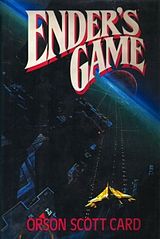 | Very briefly, the story is: in the far future humans encounter an alien insect-like race and they go to war. On Earth, children are bred to be soldiers and officers in the war. One such child is Andrew "Ender" Wiggin and he is chosen to go to Command School. At Command School he undergoes extensive game-like training programs and ends up playing a significant role in the war while still a child. |
This novel also deals with bigger questions. The kids behave the way kids really behave rather than how adults wished they behaved; this was eye-opening for some adult readers. It also makes one think about the whole concept of war and genocide. Is war ever justified? Is genocide? What if your whole world was at risk? Perhaps most significantly it addresses the issue of good and evil within each of us. The very best fiction addresses such big picture ideas. Recall what Card wrote about fiction.
As a geek, I also enjoyed the shout-outs to other works. In particular, the anonymous military leaders who discuss their plans at the beginning of the chapters is very reminiscent of the Second Foundationers in Isaac Asimov's Foundation trilogy. Alluding to previous works of fiction makes a novel richer. I don't think I noticed the allusions to the Foundation Trilogy in previous readings. Recall writer plus readers makes art. :)
The take-home messages are:
- When reading, think about what you're reading. What works? What doesn't work?
- When writing, think about what you're writing. What works? What doesn't work? How can you write really effective characterizations to put the reader in your character's head? Can you add fabulous plot twists? How can you address big picture ideas in your fiction? How can you allude to other fiction?
Good luck with your writing!

No comments:
Post a Comment